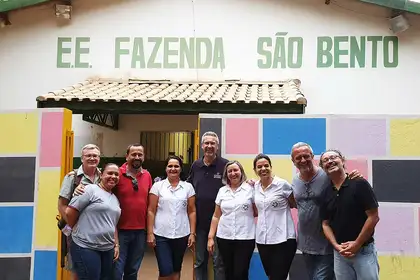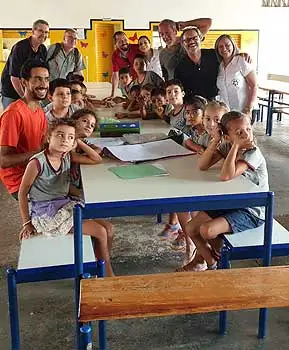
Professor Glenn Banks (centre) and Dr John Lowry (first left) with colleagues from the State University of São Paulo visiting a successful 'self-built' rural school at the heart of a community close to Presidente Prudente, established 15 years ago by the landless peasant movement.
Massey University geographers have been inspired by innovations in agriculture and opportunities for collaborative research with counterparts in Brazil.
Professor Glenn Banks, head of the School of People, Environment and Planning, travelled to Brazil with fellow geographer Dr John Lowry to work through the details of a four-year research and exchange collaboration with the Presidente Prudente campus of the State University of São Paulo (UNESP). Their trip included a visit to a small-scale farmer who has successfully developed an organic agro-ecological farm on land formerly used for beef production.

Professor Banks and Dr Lowry at the school.
Professor Banks says the organic farm – on land secured as part of a widespread landless peasant movement in Brazil a decade ago – is “something of a model for more sustainable farming systems in an environment currently dominated by cattle farming and intensive sugar cultivation”.
The geography department at UNESP secured a grant to fund the collaboration specifically to work with Massey’s School of People, Environment and Planning academics under the Brazilian CAPES scheme. CAPES, Coordination for the Improvement of Higher Education Personnel, is a Brazilian federal government agency under the Ministry of Education.
A broad set of topics was identified and will be developed over the next few months, including during a visit to Massey next April by Dr Raul Guimaraes, the lead UNESP academic driving the project.
“Social movements, community participation and links to sustainability frame the project,” Professor Banks says. “More specific comparative work is planned on agricultural, economic and rural landscape change, community participation and activism in urban and rural settings, water, waste and recycling initiatives, and rural change in decolonizing contexts.”
The use of geospatial technologies (such as GIS and Remote Sensing) for understanding and managing urban and rural transformations, water pollution and natural resource management, and the effects of agricultural change and ecological fragmentation for human and environmental health are other areas of interest. Postgraduate student exchanges will be a central to research collaborations.
“The energy, confidence and scholarship of the postgraduate geography students we met in Brazil was infectious, and they were keen to incorporate comparative aspects of New Zealand into their respective studies, be it post-colonial feminist geographies, social movements, ecological fragmentation and health, or adaptation of river systems to climate change.”